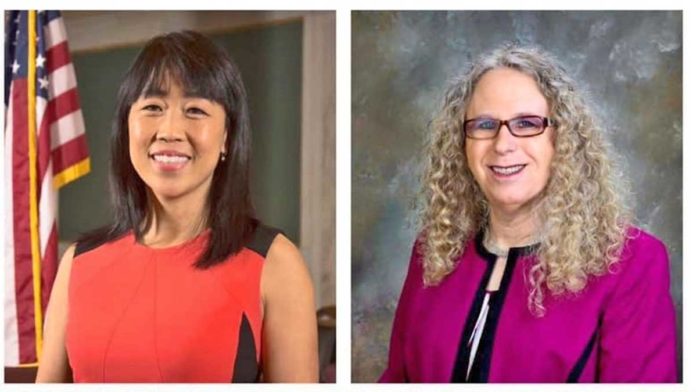Board President Fernando Gonzalez of the LGBTQ philanthropic organization Delaware Valley Legacy Fund (DVLF) began with a simple question: How has the idea of heroism changed in the midst of a global pandemic? He posed this question during DVLF’s Heroes Conversation webinar to two past Hero award recipients — Secretary of Health for the Commonwealth of Pennsylvania Dr. Rachel Levine and Councilmember Helen Gym. These two heroes of healthcare and government offered personal definitions of heroism and calls to action for change, support, and solidarity during this uncertain time.
For Gonzalez, his definition of a hero has evolved. “My mother was my hero,” said Gonzalez, “She had overcome diversity, she had come from nothing and created a family environment that was perfect as far as I was concerned. Not to say she’s not a hero to me anymore, but as I grow older and become more politically involved and try to become an advocate for people I consider to be voiceless— [my definition of a hero] changed. Frankly, I think people who are able to affect change and to do so in a way that feels deliberate and thoughtful [are heroes]. We tend to find heroes in what we find is missing in the world.”
Dr. Levine had similar thoughts, saying that “there are many heroes among us. A hero is someone who does the right thing and works for the common good.” For Gonzalez and the board at DVLF, Dr. Levine certainly fit this mold and was named as 2019’s recipient of the Individual Hero award.
Councilmember Helen Gym, who won DLVF’s 2018 Straight Ally award and is the first Asian American woman elected to Philadelphia’s city council, expanded on the idea of heroism. “While the definition may be evolving,” said Gym, “I don’t think there’s any question that the heroes are people who actually don’t have all the power, all the money, all the titles in the world. The real heroes are out stocking our grocery store shelves, they’re taking care of us in our healthcare systems, they’re making our transit run, they’re people who are setting up mutual aid societies. I hope that when we get through this, there is a mindfulness about the fact that the country relies on essential workers who are extraordinarily low paid [and lack] protective policies like paid leave or healthcare. Many of them are immigrants and people of color. We cannot go back to the way things were where we overtly abuse policies or leave folks like that behind.”
Dr. Levine confirmed that Black, Brown, and LGBTQ communities are at great risk. COVID-19 does not discriminate, said Dr. Levine, but a global pandemic does much to highlight health disparity in minority communities. “We all have to work towards a more equitable society in general and specifically in health equity,” said Dr. Levine. When asked how the state is collecting LGBTQ demographic data for those affected by COVID-19, Dr. Levine said that the current information system is “archaic” and does not include any fields for gender identity beyond the binary system or for sexual orientation. Dr. Levine put out a call out to the public for ideas on how to collect LGBTQ demographic data. “Email me,” she said.
However, Dr. Levine did express some reserved optimism about the current status of COVID-19 in Pennsylvania. “Over the last three days, we’ve seen somewhat of a smaller increase in the number of new cases,” said Dr. Levine, “That’s not definitive but it’s a positive sign. The hardest-hit area is Philadelphia, but I think that is simply [due to] population density.” With about 51,000 confirmed cases of COVID-19 in Pennsylvania, Philadelphia makes up about 33% of those cases.
After taking the position as secretary of health in 2018, Gonzalez noted that, due to the pandemic, Dr. Levine has seen a rising public profile. Dr. Levine, a transwoman, acknowledged that the attention can be difficult. “I don’t read Facebook comments,” said Dr. Levine, “Fear is the path to the dark side. Fear leads to anger, anger leads to hate, and hate leads to suffering. People fear what they don’t understand and at a time when they’re afraid anyway, I guess to some in various parts of Pennsylvania, I seem somewhat different, so they fear that and then they get angry and then they go to hate. So, the idea is to try to use knowledge and understanding as a counterpoint to fear, and hopefully, we can make progress that way.”
Gym noted that progressive issues are “rooted in people’s fundamental needs.” Gym explained that the city has expanded nondiscrimination policies and laws to include trans and gender-nonconforming people. “As much as we would all like to think of ourselves as being generous and well-intentioned, we do have to train ourselves and learn things. As we move forward, the city has the ability to actually protect the LGBT community. Inequity cannot be [solved] by goodwill alone.”
Further, Gym was not satisfied by merely calling essential workers heroes. “What is needed right now is how we honor heroes. It’s great to say platitudes, do hashtags, [make] social media posts to elevate them. But, at the end of the day, when we come back together and the country starts to reopen, are we going to deny them family leave, paid sick leave? Are we going to ensure we have healthcare for all? Are we going to ensure our beloved elders and those that are institutionalized are left isolated and [uncared for]? Are we going to leave young people behind? All these questions translate from whether the term hero is merely a platitude or [if it will be] the undergirding of a new economy and of a new vision of what civil rights, what labor rights and human rights [look like]. I hope that people are being more thoughtful now about the people we call heroes. That’s when our definition of heroism will truly be tested.”
Ask questions, get answers about COVID-19
